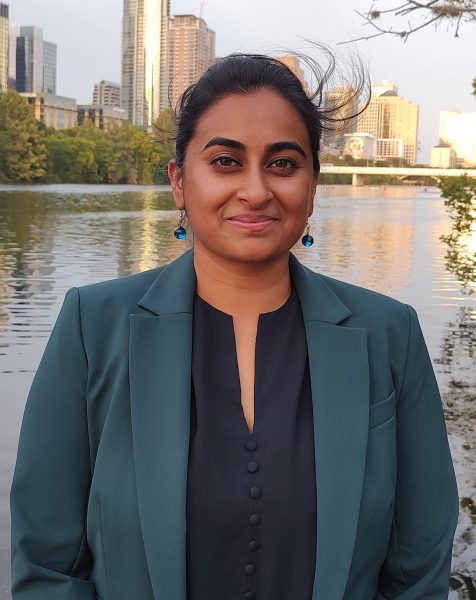Geeta Persad Receives NSF CAREER Award
July 22, 2025

Geeta Persad, an assistant professor at the Jackson School of Geosciences, has received the prestigious Faculty Early Career Development Program (CAREER) award from the National Science Foundation. The award recognizes early-career faculty who have the potential to serve as academic role models in research and education.
“It was a huge honor to get this award, especially given all of the constraints on federal funding right now,” Persad said. “When I look at the range of people who have gotten CAREER awards in our department, and who also have gotten CAREER awards in my field recently, it just makes me that much more gratified to have been selected this year.”
Persad is a climate scientist who studies the interaction between air pollution and climate change. With the funding from this award, she will work on understanding how some of the same aerosol pollutants that produce smog contribute to climate risks such as extreme temperature, rainfall and humidity, particularly when they occur at the same time.
Aerosol particles impact temperature and moisture in the atmosphere but behave differently than greenhouse gases. Persad said that she expects this to affect future climate risks. However, until now this question has not been fully investigated.
“We really need to understand that whole picture rather than just thinking about everything in terms of greenhouse gas-driven climate change,” Persad said.
Danny Stockli, chair of the Jackson School’s Department of Earth and Planetary Sciences, said that Persad’s research tackles a facet of climate science that is poorly understood, yet vitally important.
“Geeta’s research will provide critical new insights into the role of aerosols and their impact as a climate hazard. I applaud the NSF for funding this project,” Stockli said. “I am also particularly excited to see the impacts of this award in our students’ education.”
CAREER awards include both a research and education component. On the education front, Persad plans to use this funding to develop a computational field trip and climate system modeling workshop with the Texas Advanced Computing Center. This will be a day-long outing to show undergraduate students how Earth system model data is generated and how scientists use it to assess climate risk. Students will create their own data visualization and data storytelling around these projections.
Persad was a critical driver in developing the new climate system science major in the department, and is passionate about building up a workforce of scientists who understand climate change on a quantitative level. This workshop will add an experiential component to the climate major, which does not require students to take a traditional field course.
“This is one of the reasons I’m especially glad the award was funded — because we really could not have done the education component without it,” Persad said.
